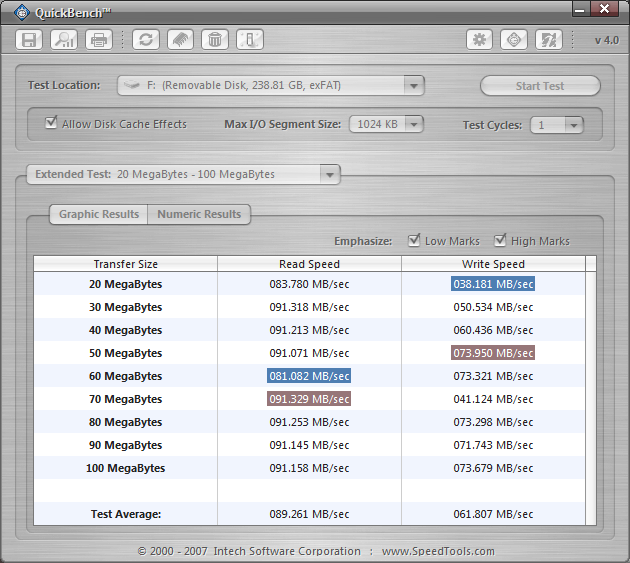QUICKBENCH VER. 4.0
QuickBench is another benchmark tool used to measure the transfer speeds and performance of storage devices. QuickBench is a good tool for confirming the previously produced read and write speeds seen above.
For our final benchmark test, we get another insight into how well the Kingston SD card performs. With Quickbench the write speeds again continue to over perform, but we do see a little bit of inconsistency – jumping from a low of 38 MB/s to a high of 73 MB/s. The read speeds are still right on par with what we expected.
REPORT ANALYSIS & FINAL THOUGHTS
Overall, we are very impressed with Kingston’s 256GB SDXC UHS-1 Class 10 memory card. Through each of our benchmark tests it well exceeded our expectations, even at times clearing the listed results by a large margin!
In a perfect world, we would have liked to have seen a little faster write performance – mainly with the inclusion of UHS-1 Speed Class 3 (U3). However, in this case we are not overly concerned because at times this memory card was nearly up in the levels of performance we would expect from a U3 memory card.
Our quick check on Amazon shows us that the Kingston SDXC 256GB memory card is available for just over $170, which is right in line with the Lexar equivalent that we reviewed previously. There is not much else to be said about the Kingston memory card, other than that should you choose to purchase this memory card, you will be happy to know that we would proudly recommend this SDXC memory card for pretty much anyone! This is why we are eagerly awarding it with our Gold Seal of Approval!
 The SSD Review The Worlds Dedicated SSD Education and Review Resource |
The SSD Review The Worlds Dedicated SSD Education and Review Resource | 


I wish sdcard (micro and normal sized) would have better random performance. Yes, i know they are usually not indended for that kind of workload, but with more and more phones and tablets coming out (and already in the wild) with little space (like 32GB or less) it would be great if expandable memory would atleast sorta match integraded eMMC performance wise.
I understand you frustrations but the issue is that the controllers on SD and microSD cards are nowhere near a match to those on eMMC or even low end SSD`s …
True, but nothing is stopping manufacturers to use eMMC grade controllers on SD cards.
Really , that sounds fascinating . Which manufacturers SD cards have these controllers ?
None, that i’m aware of.
Random performance is not really something, that is sought after in sd cards.
Fine publish. My idea for performers is to select the righties organization for projection like SD Memory Cards